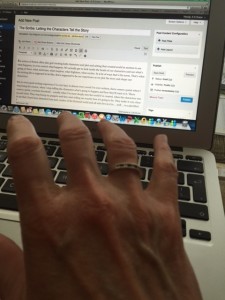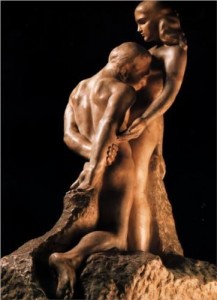 I’m sure everyone has sniggered over the annual list of contenders for the Bad Sex Awards. The little snippets from the poor authors who drew the attention of said awards are always great entertainment, but never in the way they were intended. It’s no secret, authors who write in genres other than erotica often find sex in fiction a challenge, even frightening – no matter how well-known or prolific they are and, fair enough – sex is hard to write well. We can cut them a bit of slack because they’re not erotica writers, but poorly written sex should NEVER be an issue for an author of erotica or romance in which that act of connecting is central to the plot.
I’m sure everyone has sniggered over the annual list of contenders for the Bad Sex Awards. The little snippets from the poor authors who drew the attention of said awards are always great entertainment, but never in the way they were intended. It’s no secret, authors who write in genres other than erotica often find sex in fiction a challenge, even frightening – no matter how well-known or prolific they are and, fair enough – sex is hard to write well. We can cut them a bit of slack because they’re not erotica writers, but poorly written sex should NEVER be an issue for an author of erotica or romance in which that act of connecting is central to the plot.
Context is everything in writing a good sex scene, just as it is in writing any good scene, and context is way more complex that it might appear at first thought. Contemporary erotica is obviously not like historical erotica, but neither is contemporary erotica set in New York City going to have the same feel to it as sex in a story set in rural America or a story about a tourist in Paris. Context involves time, place and language. Few things are more jarring that to have characters speak sexy out of context – even if they talk dirty – and don’t we love it when they do — it should still be dirty talk in context.
The context is also what each character brings into the sex act – their baggage, their neuroses, their kinks, their fears, their history up until that point. A virgin raised in a conservative household, having her/his first sexual encounter is unlikely to react the way someone who is more experienced would. A person who is embarrassed or ashamed of their body, won’t react the same way someone who is comfortable in their own skin will.
 And let’s not forget the situation. Angry sex won’t have the same feel as tender first-time sex or a quickie, or bored-now-let’s-get-it-over-with sex. Which leads me to the second thing to remember – timing.
And let’s not forget the situation. Angry sex won’t have the same feel as tender first-time sex or a quickie, or bored-now-let’s-get-it-over-with sex. Which leads me to the second thing to remember – timing.
Timing of a sex scene in a story is essential. Gratuitous sex is never a welcome edition unless you’re just writing wank material. Sex in a story, like everything else in a story, should do at least one of three things 1. Further the plot in some way. 2. Reveal more about the characters. 3. Cause some serious chaos and up the stakes.
A sex scene that happens too early in the story will make the reader less likely to continue after the “money shot.” A sex scene that happens too late or doesn’t happen at all will make the reader feel cheated. A sex scene that doesn’t need to be there slows the momentum of the story and, if you’ve created a pacey, interesting plot in which the reader’s engrossed, they may well just skip the sex scene anyway.
Language is at least as important in a sex scene as it is in any other part of story. The one place you don’t want your reader jarred out of is the sex act. Filthy is as filthy fits. If dirty language fits the context use it, if awkward inexperienced banter fits, use it, if perhaps it’s medical kink, use the anatomical terms.

This is another example where context is everything. You all know, I write erotica and harder erotic romance under the name K D Grace and my softer, sizzling romance, I write as Grace Marshall. The choice of language used in the two is quite different, and that difference is essential. You won’t find any hard erotica language in a GM novel, but the heat level is still there.
Has anyone noticed that a great deal of paranormal romance is really outrageously erotic? Interestingly
enough, it doesn’t get labeled erotica in bookstores or on Amazon because of the language in which the sex scenes are couched. The way in which words generate heat doesn’t necessarily have to do with how graphic they are. Sometimes it has to do with how suggestive they are, how sensual they are, how much they draw the reader into the situation. That isn’t something easily done, but it’s essential to write the level of heat into the language appropriate for the story being told. Cunts, pussies and spunk spurting cocks are out of context in a romance, but just because the words aren’t used, doesn’t mean all of the above aren’t fully present in the story. Either different words are used or the bits mentioned are written around rather than bluntly approached.
And now it’s time for my Pet Language Peeve. I can’t count the number of times I’ve been totally jarred out of a story because some writer was trying not to overuse breasts and stuck in the word globe, which puts me right back in my grade school geography class. Perhaps a writer thought maybe they’d used  fingers and hands too often and stuck in the word “digits.” My husband is a chemical engineer, he uses digits all the time in his calculations, but he doesn’t run digits through my long flowing locks. You flip pancakes, not a lover, a canal is what you take a boat down in Venice, not the thing you stick a cock in. If you need to use a word twice, use it twice! Use it three times! Hell, fill a whole paragraph with it! Just please don’t throw your reader out of the story by trying not to be repetitive. A little repetition is far less jarring that a word that takes the reader out of the action and back to grade school. Think about the choice of words and phrases you use. If you don’t want to overuse a word, then rephrase the sentence, rewrite the paragraph, consider whether or not you can eliminate some of the sentences with overused words altogether. Of course every reader, every writer, has different pet peeves, different bugaboos and someone is bound to shudder at the use of “cunt” or the use of “boobs,” or the use of … well just about everything. All I’m saying is choose you words carefully. Make them fit the characters and the situation.
fingers and hands too often and stuck in the word “digits.” My husband is a chemical engineer, he uses digits all the time in his calculations, but he doesn’t run digits through my long flowing locks. You flip pancakes, not a lover, a canal is what you take a boat down in Venice, not the thing you stick a cock in. If you need to use a word twice, use it twice! Use it three times! Hell, fill a whole paragraph with it! Just please don’t throw your reader out of the story by trying not to be repetitive. A little repetition is far less jarring that a word that takes the reader out of the action and back to grade school. Think about the choice of words and phrases you use. If you don’t want to overuse a word, then rephrase the sentence, rewrite the paragraph, consider whether or not you can eliminate some of the sentences with overused words altogether. Of course every reader, every writer, has different pet peeves, different bugaboos and someone is bound to shudder at the use of “cunt” or the use of “boobs,” or the use of … well just about everything. All I’m saying is choose you words carefully. Make them fit the characters and the situation.
Thus endeth the sermon! Go thou forth and write sexy stuff!